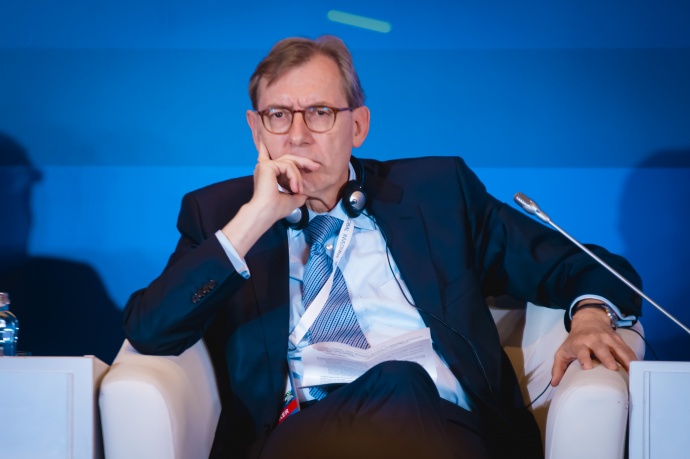Hans-Paul Buerkner: "It is very important that people associate their future with Kazakhstan"
The Chairman of the Board of Directors of the Boston Consulting Group (BCG), Hans-Paul Buerkner believes that considerable progress had been achieved in Kazakhstan due to the efforts of the Government, the private sector, the whole society." However, in his opinion, “one of the important elements is that all people, both young and old, see their future here in Kazakhstan. Even they would not dream of going to London or Singapore to implement their ideas. ”

“People should see their capabilities in existing companies, in new startups. They should use them. Perhaps they will make mistakes, but the most important thing is that there is an opportunity to implement their ideas and that all ideas come true”, said Hans-Paul Buerkner, the Chairman of the Board of Directors of BCG, during the KGIR-2019 plenary session.
According to the head of the BCG, it is wrong to divide the economy into a new and old one. “First of all, I would like to recommend you not to divide the economy into the old and the new. It is necessary to talk about the economy as a whole. About technology in general, not only about digitalization. In the past, technology has affected all industries, all sectors of the economy, all companies and our entire life. And so the artificial division of the economy into the old and the new is actually very incorrect,” says Hans-Paul Buerkner. Speaking at the plenary meeting, he recommended us not to engage in separation, but to think about how to use the opening opportunities to apply them in all sectors of the economy. “We need to think about how to use data analytics, the results of digitalization. Today we heard about the blockchain, cryptocurrency. It is necessary to understand how we can do our job better, not only considering electronic commerce, any platforms, dating sites. The key task, namely, what needs to be done in Kazakhstan, and not only in Kazakhstan, but in Eurasia as a whole, in the Eurasian economic zone, I believe that it is necessary to look more broadly, it is not enough to think only of Kazakhstan, you have a resource sector - oil and gas, mining and metallurgy, petrochemicals, agriculture, cement production, steel, service sectors, logistics, construction and financial services - we need to understand how all these sectors of the economy could be changed fundamentally,” said the Chairman of the Board of Directors of BCG.
He believes that it is necessary to look at this problem “scholastically,” that is, abstractly, without becoming attached to practical details. “I think it is very important to look at all this from a scholastic point of view. There are state-owned companies, private companies, PPP companies that have existed for decades. They need to think through all the value chains, ranging from R & D, engineering, logistics, administrative issues, financing, sales, and so on. See what will be the main difficulties, problems, what customers will complain about, where we have leaks, unnecessary expenses, where there is an opportunity to save resources, energy, how to optimize all these processes,” says Hans-Paul Buerkner.
Regarding the investment prospects and opportunities of Kazakhstan, Mr. Buerkner expressed the opinion that we should avoid “reinventing the wheel.” “Investment opportunities are the main areas in which Kazakhstan is strong. This is the oil and gas sector, these are agriculture, tourism, transport, and logistics. Do not think so - let's create something that does not exist anywhere else, of course, this is also necessary, but there is nothing wrong with copying something,” the head of the Consulting Company said.
At the same time, he noted that the main emphasis should be placed on investment in education. “I would like to warn you, no matter what company you have - big or small, state-owned, you have to invest in education and health care,” says Hans-Paul Buerkner.
In many companies, people learn how to use new technologies. It is necessary to create such a situation that all employees of the company, including those who have been working for a long time, feel their need and work together to introduce new technologies. The same is in the Government.”
